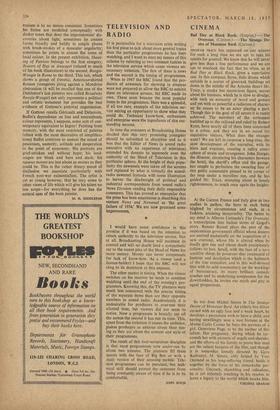TELEVISION AND RADIO
Ir is permissible for a television critic writing his first piece to talk about more general topics than the particular programmes he has been watching, and I want to start my tenure of this column by referring to two constant factors in the television service which cause viewers un- necessary irritation. The first of these is news and the second is the timing of programmes.
When in 1947 the BBC found that the pro- ducers of newsreels for showing in cinemas were not prepared to allow the BBC to exhibit them on television screens, the BBC made its own. These soon became the most popular items in the programmes. Here was a splendid, if all too rare, example of the television ser- vice seizing an opportunity to show what they could do. Technical know-how, enthusiasm and enterprise were the ingredients of this out- standing success.
In time the overseers at Broadcasting House decided that this very promising youngster should be submitted to discipline and so it was that the Editor of News (a sound radio executive with no experience of television) extended his domain to supersede even the authority of the Head of Television in this particular sphere. At the height of their popu- larity the newsreels were taken off the screens and replaced by what is virtually the sound- radio newsreel formula with some illustration to leaven the deadweight of political and industrial correspondents from sound radio's News Division reading their dully responsible comments. This has proved so unpopular that the press has been unanimous is describing this venture News and Newsreel as 'the great failure of 1954.' We are now promised some improvement.
I would have some confidence in this promise if it was based on the intention to return authority to the television service. Not at all. Broadcasting House will maintain its control and will no doubt lend a sympathetic ear to the recent plea of the Head of News for more money. Money can never compensate for lack of know-how. As a viewer (and a licence-holder) I hope that the BBC will not cling to its dominion at this expense.
The other matter is timing. When the viewer switches on his receiver he tends to continue watching until the end of the evening's pro- grammes. Knowing this, the TV planners were much less concerned with the precise timing of the separate items than arc their opposite numbers in sound radio. Academically it is undesirable for producers to over-run their allotted time, but viewers did not seem to notice. Now a programme is brutally cut off the screen the second it has run its time. This, apart from the irritation it causes the audience, makes producers as anxious about their tim- ing as they are about the content and style of their programmes.
The result of this over-scrupulous discipline is that most programmes now under-run by about two minutes. The planners fill these spaces with the face of Big Ben or with a static version of their amusing mobile. Tele- sion programmes can he punctual, but tech- nical skill should protect the customer from being constantly aware of time if he is to be comfortable.










































 Previous page
Previous page